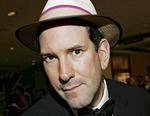 This man was one of the main reasons so many of the Millenial generation lost their innocence.
This man was one of the main reasons so many of the Millenial generation lost their innocence.
Tuesday marked the fourteenth anniversary of the day Matt Drudge, official Internet journalism hoarder, unleashed the news of the Lewinsky scandal unto the world wide web through his personal, let’s say, “unembellished” website, The Drudge Report. I hope you remembered to celebrate. Then on Wednesday, almost too perfectly timed, Drudge took up the fight again, this time at Newt Gingrich’s expense.
Drudge reported that Marianne Gingrich, Newt’s ex-wife, recently gave an interview to ABC News about their relationship, and then publicly stated that she could, “end her ex-husband’s career with a single interview…”
Sounds like good TV to me. For a little while ABC was too worried that releasing this glimpse into what it’s like to be intimate with Newt right before the South Carolina primary would be too scandalous. No kidding. I guess ABC got over its brief ethical dilemma, seeing as the interview ran last night on Nightline. Woo.
I cannot help but pause to think about why this type of event resonates so much every time it occurs. The sexual scandal in politics is nothing more than a sleeping giant, waking up every so often to ruin politicians temporarily, forcing them to get a television show or to write an inspiring memoir with a brilliant title like My Life. Clinton, Spitzer, Weiner, maybe Cain, to name a few, have all faced moral chiding from the American people after mistakes in their personal lives have become front-page headlines. Looking at the past forty years is enough to make you wince at the thought of who is entrusted to uphold our beautiful political system.
And yet this process of politicians screwing around, getting caught, getting humiliated until they agree to give up their position (or candidacy), is actually one of the most antiquated in our history. Alexander Hamilton was more than chastised after Jefferson leaked the story of his secret mistress (and the pay-offs he made to her husband to keep it quiet) in order to prevent a Hamilton presidency. Andrew Jackson became the center of Antebellum rumors after marrying his first wife before she was completely divorced. But his real notoriety came from marrying Peggy Eaton shortly after her husband died. Jackson’s cabinet did not stand by him for long after this news was out.
When the Clinton news came out, I was pretty young. I did not realize the gravity of the situation at the time, but it was my first exposure to the world of political sex scandals and it did not take long before it became normalized in my mind as something that comes with politics, as it is in so many people’s minds. I happened to be studying abroad in France last spring while the Dominic Straus Kahn affair was going on over here, and was pretty surprised to hear some of the French sentiments towards the way we treat our politicians. Apparently it is odd that we feel the right to know every detail of our politician’s personal lives. Perhaps it was the embarrassment at the thought of one of their own being caught on U.S. soil, but the French seemed to be taken aback at how we were treating DSK, with one person even muttering something to me about our “Protestant paranoia of immorality.” The fact that DSK was not the model for fidelity was nothing new to them at all, and the idea that politicians can be less-than-saintly in their daily lives is even more accepted. Their beloved Mitterrand had an entire secret family, after all.
The question of to what extent does one’s private life affect his public life is one that has been around awhile, and probably will not be answered anytime soon. Maybe it is indeed something about our Protestant history that has made us want to prove our morality at all times and also to know everything about everyone. But the argument for using private life as insight into one’s public life is not exactly an easy one. Some of the most admired figures in all of history have not been so innocent in their private lives, including Gandhi and Martin Luther King Jr. Yet we probe for intimate details ruthlessly in an attempt to understand our politicians.
At a debate in December Rick Perry addressed Newt saying, “if you cheat on your wife, you’ll cheat on your business partner, so I think that issue of fidelity is important.” Such a strange feeling when Perry makes some sense. But, not very faithful to his own words, Perry just endorsed Newt. Come on, Rick. I’m trying to see some good in you.
It seems all too likely that the news of Newt’s history will hurt him, as personal mishaps have hurt so many before him. Does his private life reflect how he will perform in public life? Possibly. Is that really the best reason why his presidential candidacy should fail? Not necessarily. Regardless, I will be watching over the coming days, along with Matt Drudge, and countless other Americans, waiting to see another politician fall victim to the sexual scandal monster.
—Rebecca Hecht

Be the first to comment on "Political Prurience"